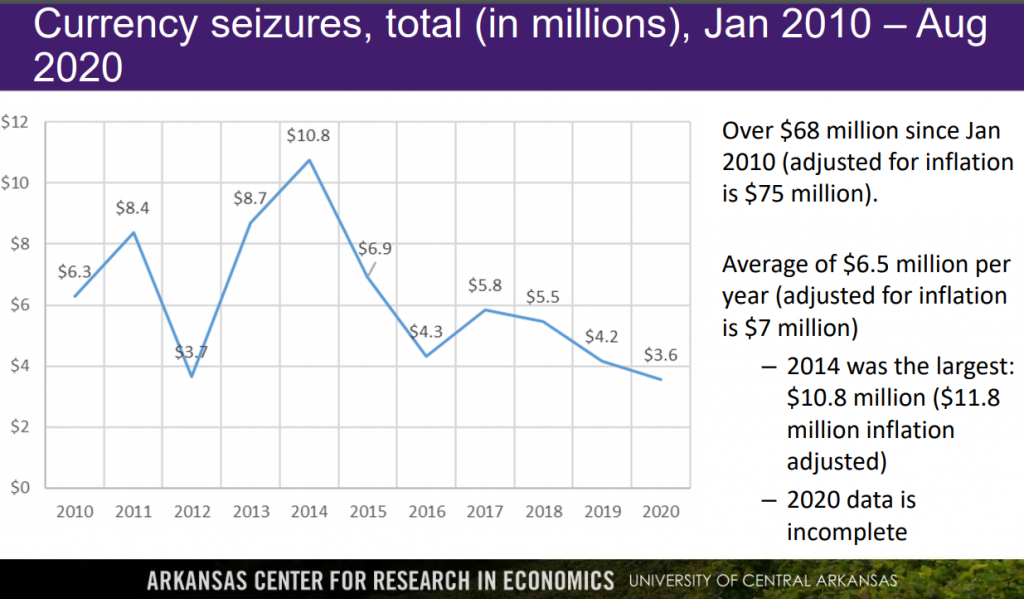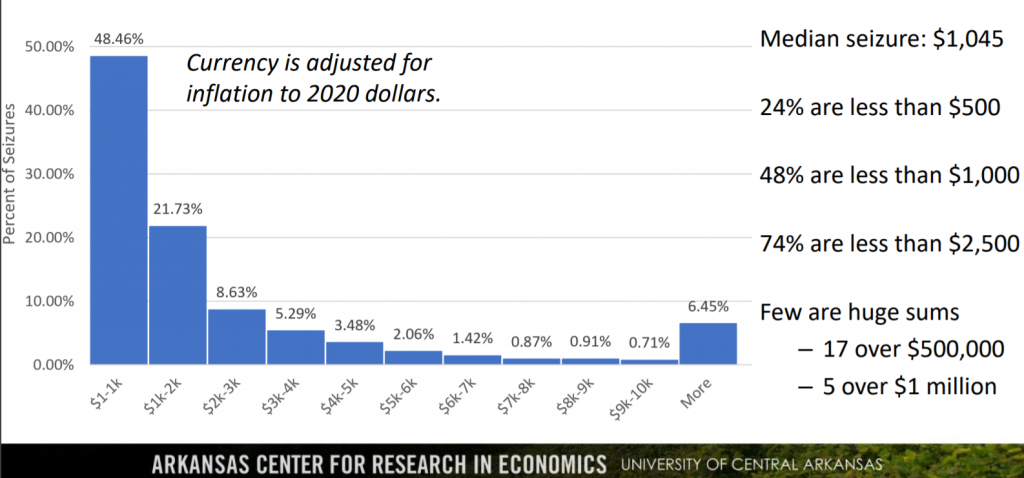By Caleb Taylor
How much cash and property was seized by law enforcement in Arkansas since 2010?
ACRE Director and UCA Associate Professor of Economics Dr. David Mitchell explained how often and how much property was taken through civil asset forfeiture since 2010 at a state Senate Judiciary Committee meeting at 1 p.m. Friday, December 18 at Room A in the MAC Building at the State Capitol.
Mitchell Testimony
Mitchell testified Arkansas has averaged about 1400 seizures per year, or about four per a day, since 2010.
It is something that happens all the time. It’s not a rare occurrence. It happens all the time.”
Mitchell testified that over $68 million in currency has been seized by law enforcement since 2010. That’s about $75 million if numbers are adjusted for inflation to 2020 dollars.
Mitchell said:
Most of the currency seizures are relatively small amounts. Almost half of the currency seizures are under $1,000. The median is $1,045.”
The following chart shows the size of currency seizures, illustrating that they are mostly small amounts.
Prosecutor Responds
Act 476 of 2019 replaced civil asset forfeiture with a criminal procedure with some big exceptions. The law prohibits the state from seizing cash or property without a conviction first unless an exception applies. These include:
- being granted immunity or reduced punishment in exchange for testifying or assisting a law enforcement agency or prosecution
- fleeing or failing to appear in court
- abandoned or disclaimed ownership in the seized property
- agreed in writing with the prosecuting attorney to give up the property
The law was signed by Gov. Asa Hutchinson on March 15, 2019. It was sponsored by State Senator Bart Hester R-District 1 and State Representative Austin McCollum R-District 95. It passed unanimously in the Senate and with 93 votes in favor in the House with 7 not voting.
ACRE Affiliated Researcher and Bowen School of Law student Aaron Newell discussed the reform in an op-ed entitled “Still too weak” in the Arkansas Democrat-Gazette on June 20, 2019.
Bob McMahan, Prosecutor Coordinator for the Office of the Prosecutor Coordinator, discussed Act 746 and why civil asset forfeiture is an “important tool” for prosecutors and law enforcement.
McMahan said:
The prosecutors actually assisted in the drafting of that specific piece of legislation to address at the time one of the most important concerns of the legislature to make sure that there was a conviction prior to forfeiture. We not only endorsed that, we assisted in the drafting of that. Forfeiture is an important tool for prosecutors and law enforcement. These are assets that are taken in conjunction or used with a crime. It’s a way to dismantle drug operations. It’s certainly a way to get after drug dealers by taking property.”
Sylvester Smith Testimony
Sylvester Smith, a defense attorney and President of Change Agents Inc., explained how civil asset forfeiture was used on the property of one of his clients, Patricia Tackett, in Hot Springs and asked for the legislature to consider certain changes to the law in order to make it easier for “innocent people” to reclaim property seized by law enforcement.
Smith said:
I think civil forfeiture is a legit tool for prosecutors to use to stop these illicit enterprises of various natures. However, the system needs to be fixed because innocent people are getting caught up in it.”
Smith suggested changing current law which requires an owner to prove they had no “knowledge or consent” of their property being used by someone to commit a crime in order to reclaim said property from law enforcement. Smith said he’d like “knowledge or consent” to be changed to “knowledge and consent” to further protect innocent property owners.
A copy of the data and graphs he used in his presentation to committee members can be viewed here. You can watch the meeting here (Mitchell’s presentation begins at 1:42:27 p.m.).


